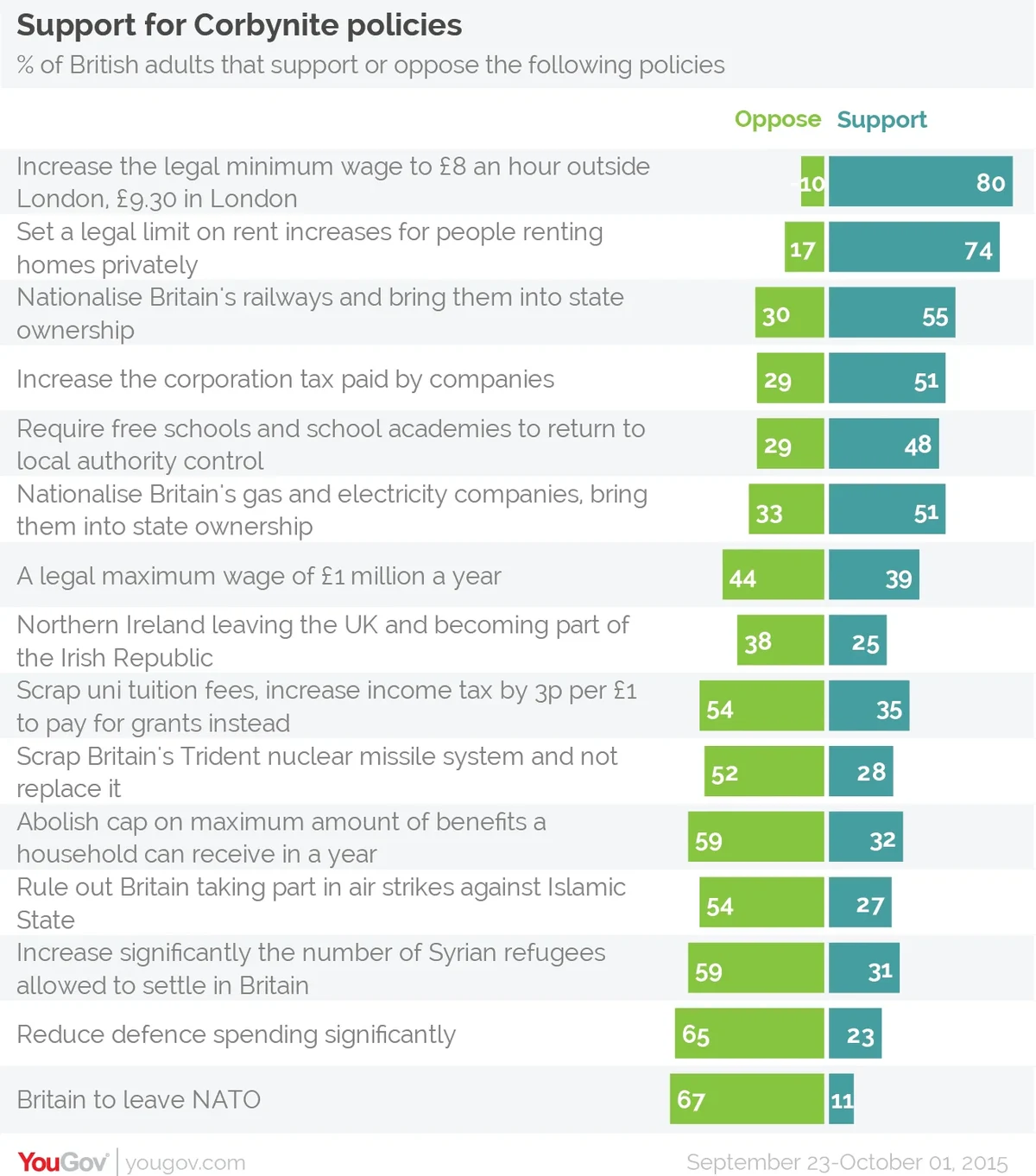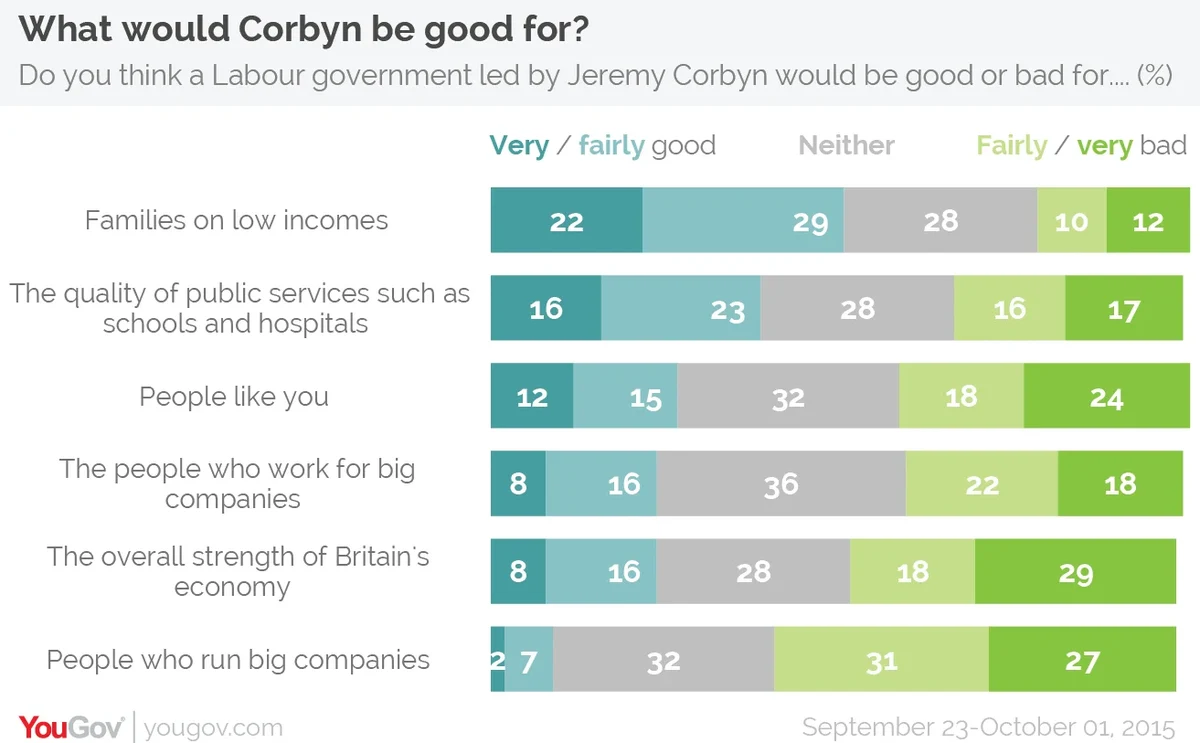Some of Jeremy Corbyn's policies are going down well with voters – but if he is to stand any chance of leading Labour to victory, he needs to sound and look like a Prime Minister
Despite the avalanche of criticism from much of the media, and the bleak despair of many Labour MPs, Jeremy Corbyn exudes a calm, determined optimism. He and his supporters think their critics underestimate his appeal. They talk of a public yearning for his “new politics”. They believe his whole approach, combining new policies with a quieter, less brutal tone, will win the converts that the party needs to win in 2020. Could they be right?
Results from this month’s YouGov/Prospect survey suggest that Corbyn is onto something. His style, and some of his policies, are going down well with many voters. He cannot be dismissed outright. That said, his path to power remains steep and rocky. Victory looks unlikely. But, then, winning his party’s leadership looked equally improbable when he launched his campaign, so maybe we should not be too dogmatic about his chances.
Public reactions to Corbyn’s agenda illustrate both his potential to advance and the hurdles in his path. We listed fifteen policies associated with his campaign for the party leadership. Not all are likely to survive; he has already modified his stance on some issues and put others out to consultation. Yet our list shows clearly where voters are on his side and where they are not.

With six of the fifteen policies we tested, supporters greatly outnumber opponents. What is striking is that, in conventional ideological terms, they are his six most left-wing policies – nationalisation of rail and energy companies, higher corporation tax, greater regulation of low pay and private rents, and local authority control of free schools and academies. Corbyn is tapping into a broad public sentiment that is hostile not only to “old politics” but also to the way people with power outside government have (as most voters see it) used that power to benefit themselves rather than the wider public interest.
The issues on which Corbyn has failed to win over voters are rather different. His defence policies all get a clear thumbs-down – scrapping Trident, ruling out attacks on Islamic State in Syria and, more generally, reducing defence spending. Very few voters think Britain should leave NATO – something Corbyn has urged in the past, though not said recently. He also has only minority support for increasing significantly the number of refugees allowed to settle in Britain. Likewise with his desire for a united Ireland – though this is the policy proposal with by far the largest number of don’t knows.
Apart from raising the minimum wage, which is immensely popular, Corbyn’s redistribution agenda attracts few supporters. By almost two-to-one, voters reject his ambition to abolish the Government’s cap on welfare benefits. Nor do voters warm to the idea of a national maximum wage of £1 million year (again, an idea floated by some supporters during his leadership campaign, though not one that he himself has proclaimed).
Our results on student tuition fees are intriguing. Corbyn has proposed higher taxes on companies and the rich to pay for the abolition of fees. As our survey finds widespread support for higher corporation tax, one can assume that, in isolation, this would attract broad approval. But would this be the most popular use of spare government cash? We tested this by pitching the abolition of tuition fees against a 3p rise in income tax. If voters really regard the abolition of fees as a priority, they would agree to higher taxes. They don’t. As with ending the welfare cap, voters are wary of anything that might lead to a higher tax bill for themselves.
The simple way to summarise our policy findings is that they are a mixed bag. But there is more to it than that. The bag has some specific features – strong support for some of Corbyn’s for curbing the market and expanding state control, but not for his international or tax-raising agenda.
As a thought experiment, let’s suppose he responded to these findings by performing u-turns on defence, welfare, refugees, tuition fees and Ireland – and that he managed to persuade his own supporters that he was not betraying their dreams and his ideals. Would he then be in course to lead Labour to victory in 2020?
Probably not – at least, not unless he managed to overcome other drawbacks detected by our survey. These are highlighted by a question about him that we asked from time to time during the last parliament about Ed Miliband. How do voters react to the thought of him becoming Prime Minister? Only 19 per cent say they would be delighted; far more, 46 per cent, say they would be dismayed. (A further 18 per cent wouldn’t mind). That produces a net score of minus 27 (% delighted minus % dismayed). Ed Miliband’s score at the same, early point, in his party leadership was minus eight. By the time of this year’s election campaign, Miliband’s score had worsened to minus 25. So Corbyn does far worse than his predecessor at the same point in his leadership, and no better than when Miliband was on the point of leading his party to a heavy defeat.
As other YouGov research has found, Corbyn generally has the worst initial rating generally of any new opposition leader since polls started monitoring them six decades ago. One major reason is that, while most voters like a number of his left-wing policies, they are not convinced that a Corbyn government will deliver greater prosperity for people like them. Not surprisingly, they reckon that it would benefit families on low incomes, and punish people who run big companies. By a narrow margin, they think public services such as schools and hospitals would benefit. But millions fear that Prime Minister Corbyn would be bad for workers, “people like you” and the economy overall.

The one crumb of comfort in these findings is that there are still large numbers of don’t knows in this battery of questions – between 28 and 36 per cent. This suggests that a large part of the national jury is still out. Corbyn needs to convince it that he can make his popular policies work in practice. On the other hand, his critics – in the media and the Conservative Party – have not really got going in attacking the specifics of his programme. Those current “don’t knows” may offer a possible upside for Corbyn, but they also threaten a downside.
In one specific sense, we have been here before. In the run-up to the 2005 general election, Michael Howard sought to exploit the fact that many of his specific policies were popular – on immigration, crime, welfare and so on. His slogan – “are you think what we’re thinking?” – sought to exploit public support for his brand of populism.
Yet the Tories still lost heavily. For the third election in a row, Britain elected fewer than 200 Conservative MPs. One major reason was that Howard was seen as too right-wing. Some people who would endorse his social agenda in, say, a pub argument, found the same policies less attractive in the mouth of a man auditioning to be Prime Minister.
Corby could face a similar problem. Other YouGov research finds an enormous gulf – far bigger even than Howard faced – between where most voters place themselves on a left-right scale (mainly near the centre) and where they place Corbyn. He is thought to be way out on the Left, much further removed from the centre than Howard, on the Right, was seen a decade ago. It’s not that voters always reject extreme policies; but they prefer them to be implemented by moderate politicians, for this provides the reassurance that they are being carried out in order to further the national interest, rather than an ideological agenda.
The outcome could depend on the outcome of the character war that is certain to be fought over Corbyn himself. His “new politics” tone is certainly popular. Compared with David Cameron, voters regard Corbyn as more in touch with people like them, more willing to listen to other points of view and more trustworthy. These are important advantages. In principle, they could be exploited to persuade voters that he is a national, and not just a factional, leader.
However, Corbyn does less well on three other attributes. He made a point at Labour’s conference of stressing his devotion to the best British values. Voters divide evenly on this when they compare the two leaders. And on patriotism, which Corbyn also claimed as a particular virtue, and competence, which always matters at election time, Cameron enjoys large leads.
Once again, there is plenty of time for public attitudes to change. And, of course, if Corbyn is still Labour’s leader at the next election, he will be up against a new Tory leader. We shall see in due course how much difference this makes to the outcome of the character war. If he is to stand any chance of leading Labour to victory, he needs above all to sound and look like a Prime Minister. This means not just promoting popular policies and stressing his devotion to “new politics”. It also means dispelling fears that he is incompetent, extreme and unpatriotic – and also wearing a suit that fits, rather than an oversized jacket, ill-matched trousers and a badly knotted tie. Of course sartorial concerns shouldn’t matter. After the revolution, comrade, let’s hope they won’t. Meanwhile, they do.
PA image








